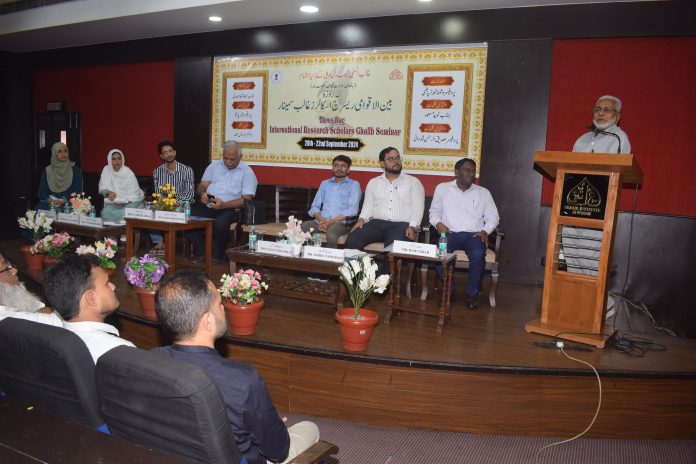New Delhi: The second day of the three-day International Research Scholars Seminar, organized by the Ghalib Institute, witnessed insightful presentations from scholars across India and abroad. The seminar focused on various research topics in the field of Urdu literature and was attended by scholars from different regions.
The first session was presided over by Dr. Mushtaq Alam Qadri, who emphasized the importance of repeated revisions before presenting research papers at such seminars. He advised scholars to review their work multiple times to identify and rectify any shortcomings. The session was moderated by Mr. Asadullah.
Papers presented included Mr. Mohammad Faraz Khan’s work on the Literary Significance of Sharh Futooh-ul-Ghaib, Mr. Shah Rukh Ubaid’s Alchemy of the Sky: Ahmad Mahfouz, Mr. Hasan Saeed’s study of A Rare Collection of Teachings from the Era of Firoz Shah: Khazana-ul-Fawaid, Ms. Shahla Kaleem’s Creative Narratives of Sabahat Aasim Wasti, Mr. Mohammad Faisal’s analysis of Husain Haqq as a Fiction Writer, and Mr. Mohammad Shibli Azad’s presentation on The Rubaiyat of Alqama Shibli: In the Light of Chahar Aina.
In the second session, chaired by Mr. Masoom Moradabadi and Professor Nadeem Ahmed, Mr. Moradabadi stressed the significance of honesty in research. He noted that recognizing the help of others is crucial for maintaining integrity, and failing to do so weakens one’s credibility. Professor Nadeem Ahmed, reflecting on past experiences, shared his memories of presenting a paper at the first Research Scholars Seminar in 1999, and encouraged the current scholars to follow in those footsteps. Presentations in this session included Mr. Mohammad Naeem Raza’s Literary Contributions of Akhtar Arenevi, Mr. Faizan Rehman’s Political and Social Awareness in the Short Stories of Shaukat Hayat, Mr. Mohammad Waseem Hussain Butt’s Personality and Literary Contributions of Shariq Rudolvi, Ms. Raheela Tabassum’s State of Research, Mr. Ram Agra’s Dalit Issues in Urdu Short Stories, and Ms. Noor Afshan’s Women’s Issues in the Short Stories of Shakeela Akhtar. This session was moderated by Mr. Yousuf Raza.
The third session was conducted online, where scholars from Pakistan presented their research papers. The session was presided over by Professor Khwaja Mohammad Ikramuddin, who highlighted the importance of seminars like these in identifying current research trends. He noted that while the West has benefited from the East’s knowledge, they have often failed to give due references, urging scholars to explore these sources.
Presentations included Mr. Mohammad Nasrullah’s The Significance of Psychological Realism in Urdu Fiction, Mr. Razaullah’s Pandemics in Urdu Fiction, Ms. Shaista Hasan’s Latin American Fiction in Urdu: A Critical and Artistic Study, Mr. Qasim Hayat’s Rhetoric and Meaning Creation in Modern Urdu Poetry, Mr. Afhamul Hasan’s Ghazals of Mehboob Khaza, and Mr. Irfan Haider’s Edward Said’s Literary and Cultural Critique: Global and Local Perspectives. This session was moderated by Mr. Naveed Raza.
The fourth and final session of the day was chaired by Professor Shaheena Tabassum, who discussed the importance of developing a genuine research mindset. She urged scholars not to consider their thesis as the final milestone but to continue critically analyzing their work even after completion.
Papers presented in this session included Ms. Sajida Khatoon’s The Concept of Negative Characters in Urdu Novels, Mr. Mohammad Naseem’s Literary Contributions of Qazi Mohammad Adeel Abbasi, Mr. Ghulam Qadir’s Poetry of Zafar Gorakhpuri, Mr. P. Ilyas Khan’s A Critical Review of the Persian Works of Hazrat Shah Rajooq Qatal Hussaini, Ms. Rizwana Kausar’s Study of Female Characters in the Short Stories of Ismat Chughtai, and Mr. Irfan Anjum’s Economic and Cultural Issues in the Selected Short Stories of Diaspora Writers. The session was moderated by Ms. Asifa Zainab.




